 Petzlover
Petzlover German Coolie is originated from Australia but Segugio Italiano is originated from Italy. German Coolie may grow 16 cm / 6 inches shorter than Segugio Italiano. Both German Coolie and Segugio Italiano are having almost same weight. German Coolie may live 4 years more than Segugio Italiano. Both German Coolie and Segugio Italiano has same litter size. Both German Coolie and Segugio Italiano requires Low Maintenance.
German Coolie is originated from Australia but Segugio Italiano is originated from Italy. German Coolie may grow 16 cm / 6 inches shorter than Segugio Italiano. Both German Coolie and Segugio Italiano are having almost same weight. German Coolie may live 4 years more than Segugio Italiano. Both German Coolie and Segugio Italiano has same litter size. Both German Coolie and Segugio Italiano requires Low Maintenance.
 The German Coolie is misnamed as it is an Australian bred dog and often called the Australian Koolie or Coolie. This Australian breed is more often just called a Coolie. The breed is a typical herding breed and a working dog that needs a job all the time. They have been a favorite of Australians since the late 1800’s when local dogs were bred with British working dogs.
The German Coolie is misnamed as it is an Australian bred dog and often called the Australian Koolie or Coolie. This Australian breed is more often just called a Coolie. The breed is a typical herding breed and a working dog that needs a job all the time. They have been a favorite of Australians since the late 1800’s when local dogs were bred with British working dogs.
Although all Coolie’s are not the same. Within the breed there is a lot of variation. This is because the Coolie was bred individually for different regions in Australia. In a very different writing the Koolie Club of Australia does not define the Coolie breed on confirmation as all other purebred dogs are defined. Instead the Coolie is defined by ability to work. In light of this most Coolie breeders state that the Coolie is a breed and the variations you see among regions are types within the breed.
As a herding dog, the Coolie brought a lot of skill to the Australian farmers and sheep herders. The Coolie will round up the sheep and bring them back to their enclosure at the shepherd’s command. They are upright, silent, working dogs. Not only do they herd sheep they are important at sheering to “cut out” the sheep or assist in the close quarters of lambing.
In Queensland North and New South Wales, the Coolie is medium boned, tall and agile ready to herd cattle over a long stretch of miles. In the Snowy Mountains of New South Wales and the Hunter Valley Region, the Coolie is shorter and thicker in order to be able to get cattle that are lying low out from the gullies and dense bush. The Coolies found in Victoria are the smallest of all.
No matter where they live and work, the Coolie is bred to help the workers there, the farmers, the stockman, and the grazier. All Coolies are adaptable and very agile. They all have a strong willfulness to accomplish what they are asked to do. The ancestors of these various Coolie was the British Collie – a smooth coated, blue merle. This Collie was crossed with the Black and Tan Collie from the Scottish Highlands. It is believed that these are the same Collie breeds that came to Australia to create the Heeler.
The name may come from the German immigrants working in South Australia and unable to pronounce Collie incorrectly they called the dogs German Coolies. There is also a fraction of German breeders who believe that the German Tiger dog was brought to Australia in the 18th century and then when the Collies came they were bred together. Many Coolie breeders have records showing that the breed has been in Australia for at least 160 years. It is also believed that the Border Collie and Kelpie (Blue Heeler) were mixed into the breed at sometime as well.
No bench standard exists for the German Coolie even though there is the Koolie Club of Australia. The mission of the club is to protect, preserve and promote the breed. The Australian Sporting Register was recognizing the Coolies in 2004. They are eligible to participate in the Australian National Kennel Council sanctioned sporting trials. They participate in Queensland, New South Wales and Victoria through the individual states sporting register. Here they participate in herding, jumping, obedience, agility and tracking.
Several other recognitions as a herding breed soon followed. The Australian Shepherd Club of America, the American Herding Breed Association, were followed by recognition from others as well. They are not recognized by the American Kennel Club (AKC).
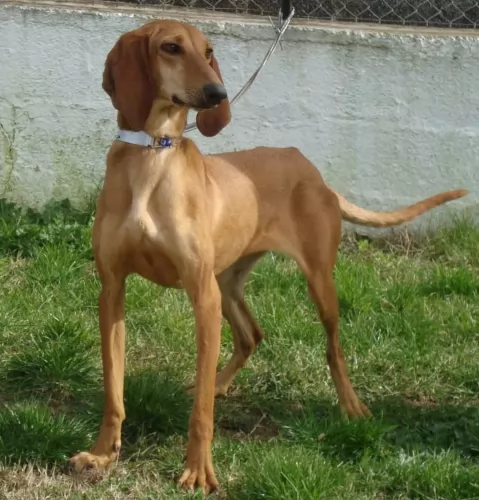 Known also as the Segit, the Segugio Italiano is an ancient dog breed believed to have descended from Egyptian hounds.
Known also as the Segit, the Segugio Italiano is an ancient dog breed believed to have descended from Egyptian hounds.
Both males and females stand at between 48 and 58cm and they weight between between 18 and 28kg. It’s a medium to large sized dog. The dog is a scenthound and was at first used for wild boar hunting in ancient times. Once wild boar numbers become much less, the Segit itself dropped in numbers, and it faced extinction.
Dedicated houndsmen worked hard to restore the numbers and the dog was successfully bred. It is a popular dog in Italy today. The Segugio Italiano isn’t recognized by the American Kennel Club whereas the Kennel Club in the UK recognizes it in the Hound Group.
 With their strong ancestry among the family of collies and herders, the German Coolie shares the look of collies and shepherds. Even though they differ from region to region and there is no actual standard, they are medium sized dogs with blue or brown eyes or even one of each. The ears are folded over on top when relaxed but they are rigid and straight when he is more alert. The nose is either chocolate or red depending on the color of their coat.
With their strong ancestry among the family of collies and herders, the German Coolie shares the look of collies and shepherds. Even though they differ from region to region and there is no actual standard, they are medium sized dogs with blue or brown eyes or even one of each. The ears are folded over on top when relaxed but they are rigid and straight when he is more alert. The nose is either chocolate or red depending on the color of their coat.
They can have either a long, medium or short coat but most owners want the short coat that is smooth as well. The coat can be one color – red/chocolate or black; Bi – red/white or black/white; Tri – solid black or red with white and brown; Tri merle -merle with white and brown; Merle – red merles and blue merles. Regardless of color, the German Coolie has the look of a collie or German Shepherd.
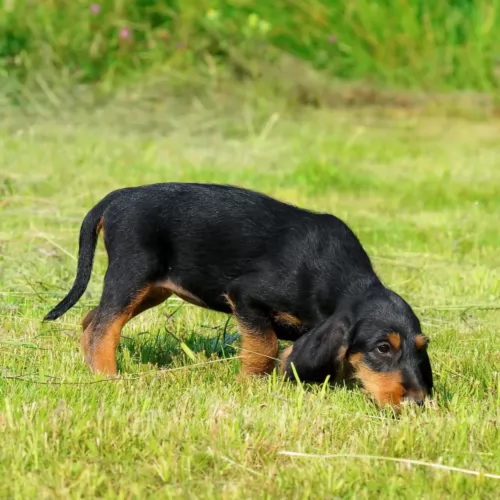 The Segugio Italiano has a distinctive look to him. He’s a large dog standing at between 68 and 76cm in height and weighing between 16 and 27 kg.
The Segugio Italiano has a distinctive look to him. He’s a large dog standing at between 68 and 76cm in height and weighing between 16 and 27 kg.
The body is lean and muscular and the Italian Scenthound has an amicable looking expression on his face. The coat of the dog is available in two types - short-haired or wire-haired.
The short-haired variety needs to be brushed on a weekly basis but is generally easy to maintain. Wire-haired dogs may require hand-stripping several times a year.
The coat of these dogs range from deep red to wheaten or black. Many dogs have white markings on the head, chest, feet, and the tip of the tail. The ears are long and floppy. If you want your dogs to have puppies, you can expect a litter size of between 4 to 6 puppies.
As a Scenthound, the Segugio Italiano is an intelligent dog, easily trained. He is best trained and socialized as he tends to be stubborn and he is also an independent strong-willed dog. It’s not an aggressive dog and yet it makes a good watchdog.
He’s adaptable but wouldn’t adjust well to living in a small space in the city.
 Yes, they can be very friendly with children is they are socialized and supervised.
Yes, they can be very friendly with children is they are socialized and supervised.
They have enough stamina to work for 14 hours a day.
They are very adaptable. They can be calm and steady when working a mother and baby lamb and then be able to forcefully move steers, bull, rams or weathers.
The breed is highly intelligent, and their learning ability is excellent because they want to please you.
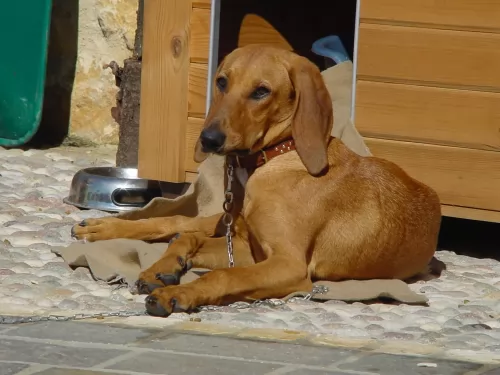 The amicable Segugio Italiano just wants to please. They get on well with children and pets. They’re easy going dogs that will require a good deal of exercise.
The amicable Segugio Italiano just wants to please. They get on well with children and pets. They’re easy going dogs that will require a good deal of exercise.
They make wonderful pets and companions, being particularly well suited to outdoor type of people. They make good watchdogs too, and with his interesting looks, his intelligence and gentle nature, you’re going to have an exceptional canine companion.
 This is a relatively healthy breed without many genetic disorders found in purebreds due to the 160 years they have spent fairly isolated and allowing natural selection to take its course.
This is a relatively healthy breed without many genetic disorders found in purebreds due to the 160 years they have spent fairly isolated and allowing natural selection to take its course.
In Merle dogs there can be deafness and/or blindness. If you breed a solid to a merle you can eliminate that.
These are not inherited but rather acquired due to the immense amount of jumping and running.
Rare but it does occur and can be fatal if not treated
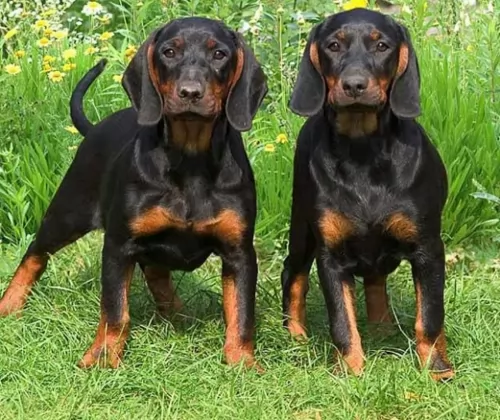 When you have a Segugio Italiano, you’re not likely to be spending much money at the vet, as these dogs are fairly healthy.
When you have a Segugio Italiano, you’re not likely to be spending much money at the vet, as these dogs are fairly healthy.
If your pet does show signs of illness, as a responsible pet owner it is your job to get him pet to the vet quickly as this can prevent other problems developing.
Dogs with such long ears can be more prone to ear infections. Your pet can be in pain and he will shake his head and paw at the infected ear. He may also be vomiting from nausea. You need to get your dog to the vet as soon as possible because with severe ear infection cases, there can even be facial nerve damage.
 Break meals into 3 a day feeding a high quality dry puppy food designed for dogs of his size. 11/2 to 2 cups per day.
Break meals into 3 a day feeding a high quality dry puppy food designed for dogs of his size. 11/2 to 2 cups per day.
Break meals into 2 a day feeding a high quality dry adult food designed for dogs of his size.
Traditionally good health. Great energy, intensity and devotion to work and owner.
This is an energetic dog that loves to work and needs to work. Regular routine exercise is needed daily. He needs to be stimulated mentally and physically. Find him a job. Make sure he knows what you want him to do. They work well with a human partner in games such as agility, tracking, flyball and herding. They need a large yard and a lot of play time. They are not couch potatoes and would be unhappy if they were stuck in a house or apartment
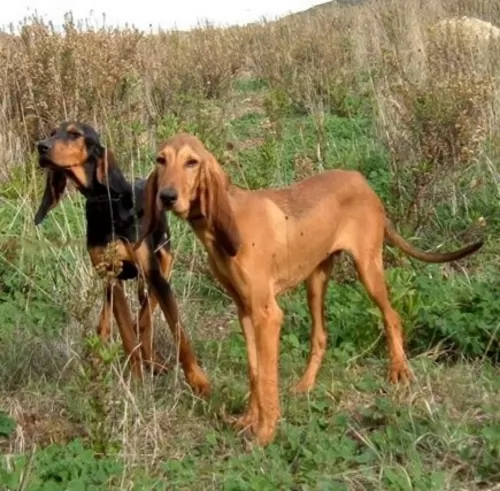 The Segugio Italiano comes with two coat types, the short-haired variety as well as the wire-haired variety. The short-haired dog will need to be brushed at least twice a week, while the wire-haired dog may require hand stripping.
The Segugio Italiano comes with two coat types, the short-haired variety as well as the wire-haired variety. The short-haired dog will need to be brushed at least twice a week, while the wire-haired dog may require hand stripping.
Segugio Italianos love a good bout of exercise, and out on the hunt they are constantly on the move. They’re known for their stamina, but once back at home, they can settle down quite calmly. Make sure this pet of yours is well exercised, whether walks, running off his leash or ball games.
Have a good look at the size of your dog, his age and energy levels before choosing dog food. When feeding your dog, don’t make it all complicated. All your dog wants is a simple, nutritious meal.
There are good commercially manufactured dog foods on the market and by reading the labeling you can ensure the best kibble for your pet. Try and give him some home made food too.
Boiled chicken, brown rice or pasta and spinach, sweet potatoes and carrots are a healthy choice for your pet – simple, tasty and nutritious. You can add a little bit of this twice a week to the dry kibble. Your dog will love it and it won’t cause any digestive problems.